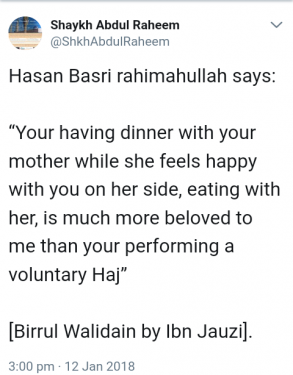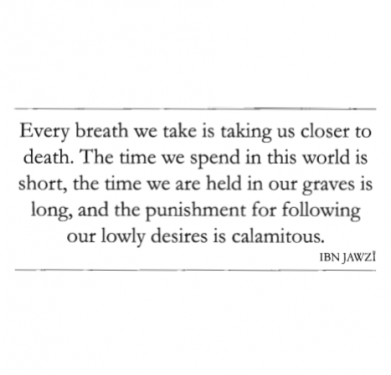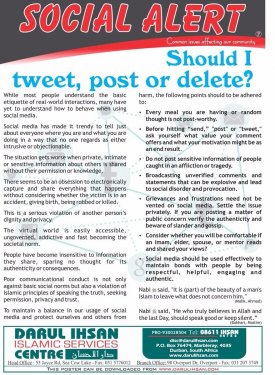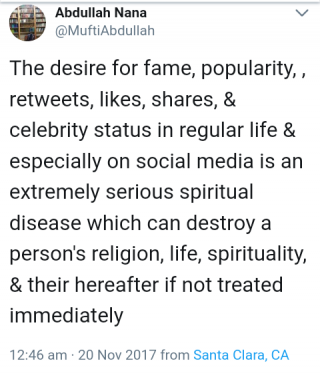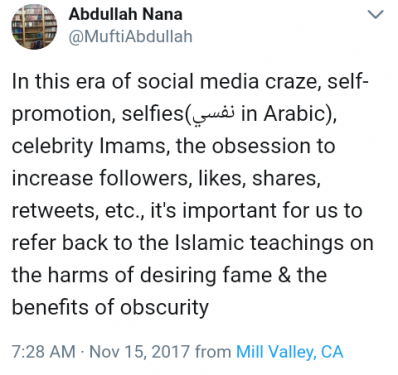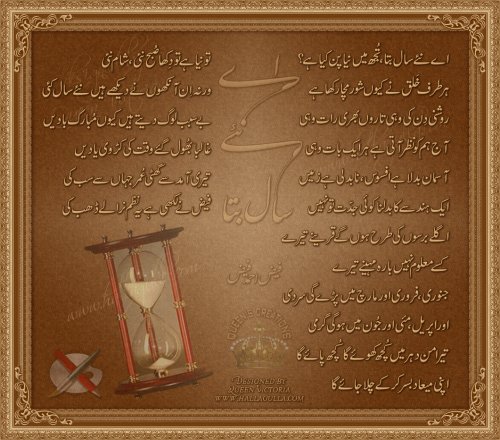-
Posts
1,761 -
Joined
-
Last visited
-
Days Won
106
Content Type
Profiles
Forums
Events
Everything posted by Bint e Aisha
-
When biding farewell to someone going on a journey When biding farewell to someone going on a journey, recite: أَسْتَوْدِعُ اللَّهَ دِينَكَ وَأَمَانَتَكَ وَخَوَاتِيمَ عَمَلِكَ “(I make) Allah responsible for your deen, your trustworthiness and for the results of your actions”. (Tirmidhi) Taken from Here
-
Recitation by Abdul Aziz Zahrani Surat Al-'Isrā' (The Night Journey) 17:1 : 21 سورة الإسراء
- 14 replies
-
- quran
- recitation
-
(and 1 more)
Tagged with:
-
? حدیث کے مختصر مضامین /48 تبلیغی روایات ۲ سوال :تبلیغی جماعت والے کہتے ہیں کہ : ایک صحابی رضی اللہ عنہ نے آپ صلی اللہ علیہ وسلم سے دریافت کیا کہ : میرے پاس چھے ہزار دینار ہیں ، اور میں ان کو اللہ کے راستے میں خرچ کرنا چاہتاہوں ، تو کیا مجھے اللہ کی راہ میں نکلنے والوں کے برابر اجر ملے گا ؟ آپ نے ارشاد فرمایاکہ: اللہ کے راستے میں نکل کر جوسو تے ہیں ، ان کے سونے کے برابر بھی نہیں ہوسکتا ۔کیا یہ بات درست ہے ؟ الجواب : یہ سنن سعید بن منصور میں وارد ہے : 2305- حَدَّثَنَا سَعِيدٌ قَالَ: نا عَبْدُ اللَّهِ بْنُ وَهْبٍ، قَالَ: أَخْبَرَنِي عَمْرُو بْنُ الْحَارِثِ، عَنْ سَعِيدِ بْنِ أَبِي هِلَالٍ، عَنْ زَيْدِ بْنِ أَيْمَنَ، عَنْ أَبِي مُحَمَّدٍ الْبَصْرِيِّ، عَنِ الْحَسَنِ بْنِ أَبِي الْحَسَنِ، أَنَّ رَجُلًا كَانَ عَلَى عَهْدِ رَسُولَ اللَّهِ صَلَّى اللهُ عَلَيْهِ وَسَلَّمَ لَهُ مَالٌ كَثِيرٌ فَأَتَى رَسُولَ اللَّهِ صَلَّى اللهُ عَلَيْهِ وَسَلَّمَ، فَقَالَ: يَا رَسُولَ اللَّهِ أَخْبِرْنِي بِعَمَلٍ أُدْرِكُ بِهِ عَمَلَ الْمُجَاهِدِينَ فِي سَبِيلِ اللَّهِ، فَقَالَ: «كَمْ مَالُكَ؟» قَالَ: سِتَّةُ آلَافِ دِينَارٍ، فَقَالَ: «لَوْ أَنْفَقْتَهَا فِي طَاعَةِ اللَّهِ لَمْ تَبْلُغْ غُبَارَ شِرَاكِ الْمُجَاهِدِ فِي سَبِيلِ اللَّهِ» وَأَتَاهُ رَجُلٌ فَقَالَ: يَا رَسُولَ اللَّهِ أَخْبِرْنِي بِعَمَلٍ أُدْرِكُ بِهِ عَمَلَ الْمُجَاهِدِ فِي سَبِيلِ اللَّهِ، فَقَالَ: «لَوْ قُمْتَ اللَّيْلَ وَصُمْتَ النَّهَارَ لَمْ تَبْلُغْ نَوْمَ الْمُجَاهِدِ فِي سَبِيلِ اللَّهِ» ۔ مگر روایت میں دو اعمال کا مقابلہ مجاہد کی دو باتوں سے کیا گیا ہے : 1) چھے ہزار دینار کا خرچ کرنا ، مجاہد کی جوتی کے تسمہ پر لگے ہوئے گرد وغبار سے ۔ 2) قیام اللیل وصوم النہار کا ، مجاہد کے سونے سے ۔ اس لئے ضروری ہے کہ بیان کرتے وقت روایت کے مطابق بات کہیں ۔ یہ بھی دھیان میں رہے کہ یہاں مجاہد کا لفظ صراحتا مذکور ہے ، تو اس سے قتال فی سبیل اللہ کرنے والے مراد ہیں ، تبلیغ میں نکلنے والے نہیں۔ ✍ بقلم الشیخ محمد طلحه بلال احمد منیار حفظه اللہ
-
? حدیث کے مختصر مضامین /47 تبلیغی روایات 1 سوال :تبلیغی جماعت والے اکثر اپنے بیان میں یہ کہتے ہیں "پهلا آسمان دوسرے آسمان کے سامنے ایسا ہے جیسے ایک بڑے میدان میں چهوٹی سی گیند موجود ہو " کیا یہ بات کہنا کہیں سے ثابت ہے؟ الجواب : حضرت ابو ذر رضی اللہ عنہ کی طویل روایت جو کتاب ( العظمة 2 / 635) ، كتاب (العرش 58 ) اور (الخلعیات) وغیرہ میں ہے، اس میں یہ وارد ہے : « مَا السَّمَوَاتُ السَّبْعُ وَالأَرْضُونَ السَّبْعُ فِي الْكُرْسِيِّ إِلا كَحَلْقَةٍ مُلْقَاةٍ فِي فَلاةٍ مِنَ الأَرْضِ ، وَفَضْلُ الْعَرْشِ عَلَى الْكُرْسِيِّ كَفَضْلِ تِلْكَ الْفَلاةِ عَلَى الْحَلْقَةِ» ۔ اس میں تمام آسمانوں کو کرسی کے مقابلہ میں ، اور کرسی کو عرش کے مقابلہ میں گیند کی طرح بتایا گیا ہے ۔ لیکن تفسير طبری (23/ 79) میں مجاہد کا قول منقول ہے : حدثنا عَبَّاسٌ، عَنْ عَنْبَسَةَ، عَنْ لَيْثٍ، عَنْ مُجَاهِدٍ، قَالَ: هَذِهِ الْأَرْضُ إِلَى تِلْكَ مِثْلُ الْفُسْطَاطِ ضَرَبْتَهُ فِي فَلَاةٍ، وَهَذِهِ السَّمَاءُ إِلَى تِلْكَ السَّمَاءِ، مِثْلُ حَلْقَةٍ رَمَيْتَ بِهَا فِي أَرْضٍ فَلَاةٍ . مجاہد کا قول مرفوع کے حکم میں ہے ۔ اسی طرح ملا علی قاری مرقاة المفاتيح (8/ 3566) میں فرماتے ہیں : لَكِنْ جَاءَ فِي الْحَدِيثِ «أَنَّ الْأَرْضَ بِجَنْبِ السَّمَاءِ كَحَلْقَةٍ فِي فَلَاةٍ، وَكَذَا كُلُّ سَمَاءٍ بِالنِّسْبَةِ إِلَى مَا فَوْقَهَا، وَالسَّمَاوَاتُ السَّبْعُ وَالْأَرَضِينَ عِنْدَ الْكُرْسِيِّ كَحَلْقَةٍ فِي فَلَاةٍ، وَكَذَا هُوَ فِي جَنْبِ الْعَرْشِ» . خلاصہ یہ ہے کہ : تبلیغ والوں کی یہ بات درست ہے ، اور اس کی اصل روایات میں وارد ہے ۔ ✍ بقلم الشیخ محمد طلحه بلال احمد منیار حفظه اللہ
-
Smoking – Let’s Clear the Air Cigarette smoking is the single largest preventable cause of death and disease The cigarette represents a uniquely dangerous drug. Just like other drugs it is unsafe at any level. Smoking is also addictive and causes harm to everyone; smokers and non smokers – passive smoking. What’s in a cigarette Tobacco smoke contains thousands of poisonous chemicals. Tobacco smoke continues to be an important contributor to toxic air. Exposure to contaminated toxic air in homes, public places, workplaces, parks, children playgrounds and Musjid car parks also affects non-smokers. It irritates the eyes, nose and throat. It can also contribute to or worsen non-smokers breathing and health problems. Tobacco smoke is very dangerous for children and babies. Tobacco smoke also affects the environment, your worship and angels Every cigarette is doing you damage Smoking just one cigarette can have immediate health effects on the body. These include: 1) Temporary increase in blood pressure and heart rate. 2) Slows down blood flow around the body 3) Reduces the amount of oxygen delivered to the tissues. Some long term effects of smoking Cigarette smoking also causes: bad breath, stained teeth, stomach and duodenal ulcers, etc. !! Warning !! Smoking cigarette Is Haraam. Not permissible in Islaam M S Sa’eed Pietermairtzbur Source: alinaam
-
Those Who Slander Ummul Mu’mineen… Those Who Slander Ummul Mu’mineen ‘A’isha And The Other Pure Wives (RA) Subsequent to the revelation of the Qur’anic verses vindicating Hadrat ‘Aa’isha رضي الله عنها, the person who slanders the pure wife of the most noble of all the Prophets, Muhammad Rasoolullah صلى الله عليه وسلم, the wife who has been referred to as Mubarraah Minas-Samaa’ [1], such a person is unanimously declared a Murtadd (apostate) because he is effectively falsifying or rejecting the Holy Qur’an. Just as scepticism in the purity and chastity of Hadrat Maryam bint ‘Imran is tantamount to kufr (disbelief), similarly, to entertain any doubt about the chastity and purity of Hadrat ‘Aa’isha bint Umm Ruman رضي الله عنها is undeniably regarded as kufr as well. And just as the Jews are cursed and damned for their slanderous allegations against Hadrat Maryam عليها السلام, similarly, the Rawafid Shia are cursed and damned for their allegations against Hadrat ‘Aa’isha رضي الله عنها. The slanderers of Hadrat Maryam Siddeeqa عليها السلام were the Jews of Ummat-e ‘Isa (Jesus), and the slanderers of Hadrat ‘Aa’isha رضي الله عنها are the Jews of Ummat-e Muhammadiyyah. A Rafidi Shia made disparaging remarks against Hadrat ‘Aa’isha رضي الله عنها in front of an Imam of Ahle Bayt. The Imam immediately directed his servant to behead the culprit, saying: “This person is guilty of disparaging Rasoolullah because Allah declares: “Evil women are for evil men, and pure men are for pure women. These people are innocent of what they (the hypocrites slanderers) say. For them (the pure men and women) is forgiveness and a gracious sustenance.”(24:26) So if this man declares ‘Aa’isha to be an evil woman, he indirectly declares Rasoolullah (Allah forbid) to be an evil man. Hence, this man is a kafir (disbeliever) who deserves to be executed.” The narrator says: “I was present when this man was beheaded.” [2] Similarly, an Iraqi once uttered a few insulting words against Hadrat ‘Aa’isha رضي الله عنها in the presence of Hasan Ibn Zaid رحمه الله. At once, Hasan Ibn Zaid رحمه الله stood up and whacked him with a stick on his head with such force that his brains spattered out and he died. [3] Similarly, a person who harbours evil thoughts about any of the other pure wives of Rasoolullah صلى الله عليه وسلم is also declared a kafir and deserves to be executed. As mentioned previously in this incident, Rasoolullah addressed the Sahabah in his sermon, saying: “O Muslims! Who will assist me in challenging that man who has caused me untold anguish in regards to my family?” From this it is evidently clear that the person who makes any form of vile remark against any member of Rasolullah’s صلى الله عليه وسلم household, whether it is Hadrat ‘Aa’isha رضي الله عنها or any of the other pure wives رضى الله عنهنّ, it is a source of anguish for Rasoolullah and he who causes anguish to Rasoolullah صلى الله عليه وسلم is undoubtedly a kafir, as Allah سبحانه و تعالى declares: “Verily, those who annoy Allah and His Messenger, Allah has cursed them in this world, and in the Hereafter, and has prepared for them a humiliating torment. And those who annoy believing men and women undeservedly, bear on themselves the crime of slander and plain sin…” Until the verse:“Accursed, wherever found, they shall be seized and killed with a (terrible) slaughter.” (33:57-61) The moment Rasoolullah صلى الله عليه وسلم made this plea, “Who will assist me in challenging that man who has caused me untold anguish in regards my family?” Hadrat Sa’d Ibn Mu’adh رضي الله عنهpromptly responded: “O Rasoolullah! We are prepared with all our hearts and lives to kill such a man.” This is why the ‘Ulamaa’ have unanimously agreed that a person who slanders the wives of ordinary Muslims is termed a fasiq and fajir (flagrant sinner) whilst the malicious person, who, out of his maliciousness, slanders the pure wives of Rasoolullah صلى الله عليه وسلم is indisputably declared a kafir and Murtadd (apostate). Furthermore, Allah سبحانه و تعالى refers to the pure wives of Rasoolullah as Ummahaatul Mu’mineen (the mothers of the believers) in the Qur’an. He says: “The Prophet is closer to the believers than their ownselves, and his wives are their mothers.” (33:6) Allah forbid! Would Allah سبحانه و تعالى ever mention a flagrant sinner or adulteress with such a lofty title? Never. Sayyiduna Ibn ‘Abbas رضي الله عنهما says: “Not a single wife of any Nabi (prophet) ever perpetrated the sin of adultery.” [4] Furthermore, the Messenger صلى الله عليه وسلم who was commissioned by Allah سبحانه و تعالى to stamp out all forms of internal and external shamelessness – and this is exactly what he did; in a few days he transformed the brazen shamelessness of the whole nation into righteous modesty, he converted their adulterous dispositions to anchors of chastity – can there be any uncertainty about such a pure Nabi صلى الله عليه وسلم, Allah forbid, that he failed to cleanse his own household of such loathsome transgression? Subhanallah! This is a grave allegation! Furthermore, the supreme human being صلى الله عليه وسلم upon whom Allah سبحانه و تعالى bestowed the mantel of Risalat (prophethood), the status of honour and love, He chose him as His Mustafa (exclusive) and Mujtaba (privileged), He chose him as His beloved servant and saintly slave, He declared him a paragon of purity and angelic attributes and He assigned Jibra’eel عليه السلام and Mika’eel عليه السلام as his second and minister respectively, it does not behove Allah’s status of glory and propriety to choose an evil adulteress as a wife for the most superior human being. This is why Allah says: “And why did you not, when you heard it, say? “It is not right for us to speak of this. Glory be to You (O Allah) this is a great lie.”” (24:16) At this point in the verse, Allah سبحانه و تعالىmentions the phrase ‘Subhaanak’ as though He implies that Allah سبحانه و تعالى is free and pure of selecting an evil woman as a wife for His revered Nabi صلى الله عليه وسلم. So the moment you heard of such an unfounded rumour, you were duty-bound to say: “Subhaanak (glory be to You), this is a blatant slander!” When Sa’d Ibn Mu’adh رضي الله عنه, Abu Ayyub Ansari رضي الله عنه and Zayd Ibn Haritha رضي الله عنه heard such a glaring rumour, they instantaneously responded by submitting: “Subhaanak, this is a blatant slander!” According to Fathul-Bari, besides Sa’d Ibn Mu’adh رضي الله عنه and Abu Ayyoob al-Ansari رضي الله عنه, instead of Zayd Ibn Haritha رضي الله عنه, Usamah Ibn Zayd رضي الله عنه is mentioned. To sum up, the person who utters such unseemly words against any wife of the Messenger صلى الله عليه وسلم, it is not permissible to give any heed whatsoever to such blatant lies. To refer to a person’s wife as an adulteress is, in effect, tantamount to referring to him as a cuckold. Those who accuse Hadrat ‘Aa’isha رضي الله عنها should reflect, what they are indirectly referring to the pure Rasool صلى الله عليه وسلم as. The heart shudders even to imagine something as ominous as this. [Seeratul Mustafa, volume 3, pp 332-336] Notes: [1] It was the habit of Masrooq رحمه الله while narrating from Hadrat ‘Aa’isha رضي الله عنها, that he would say: “Siddeeqa bint as-Siddeeq, the beloved of Rasoolullah صلى الله عليه وسلم and the Mubarraah Minas-Samaa’ (the lady whose vindication has been declared in the skies through divine revelation) narrated to me.” [2] Narrated by Lalka’i [3] As-Sarimul Maslool ‘Ala Shatimir Rasool by Hafidh Ibn Taymiyya رحمه الله [4] Tafseer Ibn Katheer Maulana Idris Kandhlawi رحمه الله Source: alinaam
-
- slander
- ummulmomineen
-
(and 2 more)
Tagged with:
-
Surah 'Abasa (80), Verses 17-42 by Mu'ayyid al-Mazen (مؤيد المزين)
- 14 replies
-
- 1
-

-
- quran
- recitation
-
(and 1 more)
Tagged with:
-
-
IS LOVING ONE'S COUNTRY PART OF FAITH? Status: FABRICATED Question What is the status of this Hadith? Hubbul Watan Minal Iman Translation: Loving one’s homeland is part of Iman Answer There are several narrations which report Rasulullah’s (sallallahu’alayhi wasallam) love and yearning for his birthplace; Makkatul Makarramah. However, the particular Hadith you question has no basis according to the Muhaddithun. ‘Allamah Saghani and Mulla ‘Ali Al Qari (rahimahumallah) have deemed this narration a fabrication. (Mawdu’atus Saghani, hadith: 81 and Al Masnu’, hadith: 106) Mulla ‘Ali Al Qari (rahimahullah) writes that IF this hadith were to be proven authentic, the correct meaning of ‘homeland’ would be Jannah or Makkah. He also offers other explanations for this narration. (Al Asrarul Marfu’ah, pg. 190-191) Note: Mulla ‘Ali Al Qari (rahimahullah) has not said that the Hadith is authentic, all he is saying is: “If per chance it was found to be authentic then the explanation would be..” (which hasn’t happened. No Muhaddith has proven these words as the words of Rasulullah sallallahu ‘alayhi wa sallam) Therefore one cannot quote this as a Hadith. And Allah Ta’ala Knows best, Answered by: Moulana Suhail Motala Approved by: Moulana Muhammad Abasoomar Checked by: Moulana Haroon Abasoomar Hadithanswers
-
Archery And Horse Riding It has been narrated on the authority of Ibn Amir (ra) who said: I heard the Messenger of Allah (may peace be upon him) say- and he was delivering a sermon from the pulpit: 'Prepare to meet them with as much strength as you can afford. Beware, strength consists in archery. Beware, strength consists in archery. Beware, strength consists in archery.' (Saheeh Muslim, 4711) It has been narrated on the authority of Uqba b. Amir (ra) who said: I heard the Messenger of Allah (may peace be upon him) say: 'Lands shall be thrown open to you and Allah will suffice you (against your enemies), but none of you should give up playing with his arrows.' (Saheeh Muslim, 4712) It has been reported by 'Abd al-Rahman b. Shamasa (ra) that Fuqaim al-Lakhmi (ra) said to Uqba b. Amir (ra): You frequent between these two targets and you are an old man, so you will be finding it very hard. 'Uqba said: But for a thing I heard from the Holy Prophet (may peace be upon him), I would not strain myself. Harith (one of the narrators in the chain of transmitters) said: I asked Ibn Shamasa: What was that? He said that he (the Holy Prophet sallallaahu 'alaihi wa sallam) said: 'Who learnt archery and then gave it up is not from us. or he has been guilty of disobedience (to Allah's Apostle).' (Saheeh Muslim, 4714) It has also been narrated that the Prophet (sallallaahu 'alaihi wa sallam) said, "Practice archery; that is good for you." (Reported by al-Bazzar and by al-Tabarani on good authority.) The Prophet (peace be on him) once passed by a group of his Companions who were competing in archery. He encouraged them, saying, 'Shoot, and I am with you.' (Reported by al-Bukhari) Allah has commanded: 'And make ready for them all thou art able of (armed) force....'(8:60) The Prophet (peace be on him) said, "The missiles (arrows) are the force," repeating it three times. (Reported by Muslim.) Allah Ta'ala says, 'And (He created) horses, mules, and donkeys for you to ride and as adornment....' (16:8), and the Prophet (peace be on him) said, "There is blessing in the forelocks of horses." (Reported by Ahmad.) He also said, "Practice archery and horseback riding." (Reported by Muslim.) And again, 'Any action without the remembrance of Allah is either a diversion or heedlessness excepting four acts: walking from target to target (during archery practice), training a horse, playing with one's family, and learning to swim.' (Reported by al-Tabarani on good authority.) Said Hadrat 'Umar (RA), "Teach your children swimming and archery, and tell them to jump on the horse's back." The Prophet (sallallaahu 'alaihi wa sallam) also said, 'Horses are of three kinds: the horse of al-Rahman (the Most Merciful, i.e., Allah), the horse of man, and the horse of Satan. As for the horse of the Most Merciful, it is dedicated to jihad in the cause of Allah, so feeding it, cleaning its urine and dung, and everything related to it are counted as good deeds. As for the horse of Satan, it is that on which people bet and gamble. As for the horse of man, it is that which is for breeding, and it is a protection against poverty.' (Reported by al-Bukhari and Muslim.)
-
DISCIPLINING THE SOUL In the Name of Allâh, the Most Beneficent, the Most Merciful Know that all the facets of mankind's disposition are for their benefit - either directly such as the desire for food, or indirectly by preventing harm, such as the capacity for anger. However, when these natural impulses are not moderated it culminates in harm. If the desire for food is excessive it leads to gluttony. Similarly when anger is uncontrolled it leads to transgression. The aim should be to achieve equilibrium of the soul, to allow the faithful to approach God without distraction. The author addresses many spiritual diseases - such as envy, greed, uncontrolled lust, sexual desire, arrogance, gluttony, anger, stinginess, extravagance, vanity and attachment to this world. He also discusses the qualities that the seeker of God must acquire - such as love, self discipline, humility, self-criticism, improvement of character, patience and truthfulness. In a simple yet effective way he shows the wayfarers how to cure their spiritual diseases and acquire the necessary qualities for their journey to Allah. This masterpiece has been divided into thirty chapters to facilitate the reader's comprehension. Important points are highlighted using anecdotes from the early righteous predecessors. The author, Ibn al-Jawzi (d. 597 AH) was an erudiate scholar of the Hanbali madhab. Download
-
- spiritual diseases
- desires
-
(and 1 more)
Tagged with:
-

Using Social Media - A Responsibility
Bint e Aisha replied to ummtaalib's topic in General Islamic Articles
- 15 replies
-
Islamically, What is Beneficial Knowledge?: The Prophet ﷺ instructed us: سَلُوا اللَّهَ عِلْمًا نَافِعًا وَتَعَوَّذُوا بِاللَّهِ مِنْ عِلْمٍ لَا يَنْفَعُ 'Ask Allah for beneficial knowledge and seek Allah's protection from knowledge that does not benefit.' * Beneficial knowledge, in short, is that which increases us in knowledge of God; acquaints us with the divine commands and prohibitions; leads us to detaching ourselves from the world and becoming desirous of the Hereafter; and brings home to us the flaws and defects in our own actions and character. Knowledge must be transformative. It should be internalised and rooted in the heart in order to beget reverent awe before God and humility before man. Sound intention is key. Malik b. Dinar said: ‘Whoever learns knowledge so as to act by it, his knowledge humbles him. Whoever seeks it for other than that, will only increase in pride by it.’** In this regard, Imam al-Dhahabi left us with this gem: ‘Whoever seeks knowledge in order to act by it, his knowledge humbles him and causes him to weep at himself. But one who learns knowledge just to teach, give fatwas, to brag or show-off, becomes foolish, arrogant, argumentative, perishes in his vanity and is despised by others: "He is indeed successful who purifies it [his soul], and is a failure who corrupts it." [Qur'an 91:9-10].’*** Our prayer, then, should be as our Prophet taught: اللَّهُمَّ انْفَعْنِي بِمَا عَلَّمْتَنِي وَعَلِّمْنِي مَا يَنْفَعُنِي وَزِدْنِي عِلْمًا 'O Allah! Benefit me by what you have taught me, teach me what will be of benefit to me and increase me in knowledge.'**** ——————— *Ibn Majah, no.3843. **Cited in al-Khatib al-Baghdadi, Iqtida al-‘Ilm al-‘Aml (Beirut: al-Maktab al-Islami, 1977), no.31. ***Siyar A‘lam al-Nubala (Beirut: Mu’assasah al-Risalah, 1996), 18:192. **** Al-Tirmidhi, no.3599, where he said: 'This hadith is hasan gharib.'
-

Using Social Media - A Responsibility
Bint e Aisha replied to ummtaalib's topic in General Islamic Articles
SELFIES AND SOCIAL MEDIA When a supervisor says “I am watching you”, it is said in a threatening manner. Allah regularly reminds us in the Qur’an that He is the All-Seeing in a loving, merciful and compassionate manner. I was pondering over this, and social media came to mind. In our day and age, technology is considered the way forward and an obsession in our modern era. Whether young or old, you would be hard-pressed to find someone without a handheld device. Though a phone was designed to call and text, nowadays, the camera is a greater selling point. That is how Shaytan has made common the sin of taking pictures of living beings. Selfies which were once unheard of, have become very common now. It made me wonder, why do people do it? Why do people who would once upon a time, cycle to simply unwind, now cycle and video their journey? Or keep a log of their activities on social media, which they would have previously kept to themselves? Often it is an act of ostentation or vanity. Our concern lies with impressing people online, thus we share private aspects of our lives to draw attention. But in reality, only a few people may notice, some may be jealous and most people do not care. In contrast, Allah cares about what we do, He is the All-Seeing. Even when our cameras are off, His are still on. He is watching even when no-one else can. Technology can fail us. At times the camera dies whilst a person may think it is still on and recording. Allah never fails to watch and record us. Therefore, if you desire to show someone, show Allah. Want to impress someone? Impress Allah. If you impress people on social media you may just get a few likes, comments and shares and that is all. However, if you impress Allah He will grant you Jannah, a reward far greater than we can possibly imagine. A seeker will always find what he seeks. Seek people, you will never be able to acquire their pleasure. Seek Allah and you will acquire Him, via His mercy in this life and His honorable presence in the afterlife. May Allah rid our hearts of ostentation, vanity and all such evil qualities, Aameen. — Hazrat Ml. Dawood Seedat حفظه الله Above is an article taken from www.islaahiadvices.com. It is an extract from Hazrat’s talk on 25/09/17. To listen to the full talk, please click here.- 15 replies
-

Using Social Media - A Responsibility
Bint e Aisha replied to ummtaalib's topic in General Islamic Articles
Selfie craze and evil eye New car? Take a selfie. Put it on social media. Child's birthday? Take a slefie. Put it on social media. New job? Take a selfie. Put it on social media. Nice meal? Take a selfie. Put it on social media. Got married? Take a selfie. Put it on social media. Performed Hajj/Umrah? Take a selfie. Put it on social media. New look? Take a selfie. Put it on social media. All done? Then we wonder why things go terribly wrong. Allah Almighty says 'And from the evil of the envier when he envies'. (113:5) The Messenger صلى الله عليه وآله وصحبه وسلم said 'the evil eye is real'. (Hadeeth) A private life, is a safe life. But it's difficult to kill the ego and desire, and not share half of our lives with half the world. May Allah Almighty protect us all from the evil eye Ameen- 15 replies
-

Using Social Media - A Responsibility
Bint e Aisha replied to ummtaalib's topic in General Islamic Articles
SELFITIS Among the greatest qualities of a Believer is humility. Conversely, pride and arrogance are among the worst diseases that can afflict a person. A humble person is beloved to Allāh Ta‘ala and is also loved by people, while a proud person or one who loves to “show off” falls from the grace of Allāh Ta‘ala and is disliked by people as well, though they may appear to respect him. Pride and vanity are not detected by means of an X-ray or CT scan. Instead they are manifested in one’s utterances, reactions to situations, choices, manner and general conduct. One of the recently discovered symptoms is “Selfitis”. Inflamed Ego and Narcissism The Psychiatrists have defined “Selfitis” as being “the obsessive, compulsive urge to take photos of one’s self and upload them on social media.” In essence, the victims of this illness are major attention seekers[1]. They further explained that the suffix “itis” by which the word ends generally refers to inflammation. Hence bronchitis refers to inflammation of the lungs and tonsillitis to the inflammation of the tonsils. Thus this disorder was named “Selfitis” as the people who suffer from it are generally prone to having “Inflamed egos” which leads to Narcissism.[2] Pious Disorder In Makkah al-Mukarramah, authorities are concerned about people causing serious congestion by stopping to take selfies of themselves in the midst of making tawāf (circumbulation) of the Kā’bah. “We now have people who during the Friday prayers, instead of listening to the Imam, prefer to take pictures of worshippers or to indulge in selfies. The problem is that you cannot talk to them because these are the Friday prayers and worshippers must not speak at all,” authorities said. Another pilgrim, Khalid Al-Shimrani, a Kuwaiti, said: “The sight of the Kā’bah is truly wonderful and being next to it is an exhilarating experience that I would love to share with my friends and followers on social media,”. [3] Doesn’t Mr. Shimrani know that the exhilarating experience is that of the heart? A selfie cannot capture a feeling of ecstasy, only an emotion of the face. Can one be so devoid of spirituality at a place when he is supposed to be full of it? Is the Kā’bah an entertainment hot-spot? Can a selfie help one to relive an intensely spiritual moment in which you are drowned in communication with your Lord? The ahādīth have sounded numerous warnings for people who engage in the sin of photography. Apart from these warnings, when a person is filled with such vanity and conceit that his ego tricks him into thinking that the entire world is simply dying to share every moment of his mundane life with him, and thus he cannot see past his own face, how is he supposed to see the majesty and glory of Allāh Ta‘ala? Finally, it’s understandable that all humans have a desire to be recognized and appreciated, or to relive some of their memories, but this is not achieved by photographs or selfies. We need the recognition and approval of our Creator, and not His creation. In our most intense moments of prayer and spirituality, there is no thought of anyone but Him, why destroy this sacredness with a picture? This year, take the best selfie on the day Eid, that of your heart, and present it to your Lord. Wait for the ‘like’ or ‘dislike’ on the Day of Judgment. Footnotes: [1]- Barry, C. T., Doucette, H., Loflin, D. C., Rivera-Hudson, N., & Herrington, L. L. (2015, June 29). “Let Me Take a Selfie”: Associations Between Self-Photography, Narcissism, and Self-Esteem. “Let Me Take a Selfie”: Associations Between Self-Photography, Narcissism, and Self-Esteem. Available from: https://www.researchgate.net/publication/281317126_Let_Me_Take_a_Selfie_Associations_Between_Self-Photography_Narcissism_and_Self-Esteem [accessed Jun 22, 2017]. [2]- Gwendolyn Seidman Ph.D. Are Selfies a Sign of Narcissism and Psychopathy? Available from: https://www.psychologytoday.com/blog/close-encounters/201501/are-selfies-sign-narcissism-and-psychopathy [accessed Jun 22, 2017]. [3]- http://gulfnews.com/news/gulf/saudi-arabia/kaaba-selfies-trigger-heated-online-debate-1.1541422 Published by: Naseeha Channel (Telegram)- 15 replies
-

Using Social Media - A Responsibility
Bint e Aisha replied to ummtaalib's topic in General Islamic Articles
- 15 replies
-

Using Social Media - A Responsibility
Bint e Aisha replied to ummtaalib's topic in General Islamic Articles
- 15 replies
-
"Still studying? Come on!" A man entered upon a gathering where a Shaykh was teaching Sahih Al-Bukhari to his students. In mockery of that gathering, the man said, "People in the West have managed to land on the moon whilst you're still teaching Sahih Al-Bukhari!" The Shaykh responded, "Why does that surprise you? They are a creation who've reached another creation, whilst we are a creation who want to reach the Creator. But I tell you this; you are the most hopeless person in this gathering, for you've both failed to reach the moon with them and failed to study Al-Bukhari with us" If Allah has inspired you to pursue a path of knowledge, then you've been inspired with a blessing that's beyond the planets. وَمَنْ سَلَكَ طَريقًا يَلْتَمِسُ فِيهِ عِلْمًا سَهَّلَ اللهُ لَهُ طَريقًا إِلَى الجَنَّةِ "Whoever pursues a path to gain knowledge, Allah will ease for him a path that leads to Paradise." Prophet Muhammad صلى الله عليه وسلم (copied)
-
Shaykh ul Islam Ibn Taymiyyah (rahimahullah) said: “The Arabic Language is from the Religion, and the knowledge of it is an obligation. For surely the understanding of the Qur’ân and the Sunnah is an obligation, and these two are not understood except with the understanding of the Arabic Language, and whatever obligation is not fulfilled except by certain steps then those steps themselves become obligatory (to fulfil the initial obligation)” [The Necessity Of The Straight Path by Ibn Taymiyyah ( 1/470)]***Shaykh ul Islam (rahimahullah) also mentioned a statement of Imam Ash Shafi’ee (rahimahullah), he said:…this is because the (language) that Allah choose is Arabic. He revealed His glorious book (The Quran) in this language and He made it the tongue of His final and last prophet, Muhammed -sallahu alahi wa salem. Therefore, we say: it is befitting for everyone that has the ability to learn this language to do so, this is because it should be the most desired language to learn. At the same time, it is not forbidden for people to speak with other than the Arabic language.[Iktidah As Siralt Al Mustaqeem 1/521)]***Shaykh ul Islam Ibn Taymiyyah (rahimahullah) also said:'The Salaf would admonish their children for making Arabic grammatical mistakes. Due to this, we are ordered, whether it be an obligation or a recommendation, to preserve the Arabic (grammatical) laws, and to correct the tongues that have deviated from the correct speech. By doing so, we preserve the methodology of understanding the Quran and the Sunnah. We also preserve the following of the Arab in their manner of (correct) speech. If people were left with their grammatical mistakes, this would be considered a great deficiency and despicable mistake.' [Majmoo' Al Fatawa 32/252] Source
-
Sh. Salek: "I'm amazed how one can claim to love the Prophet (صلی اللہ علیہ وآلہ وسلم) without concern to learn his language." Source
-

Worried – How to Perform Umrah?
Bint e Aisha replied to adyiqbal's topic in General Islamic Discussions
Walaikum us Salam Is it your own innovative way of advertising? -

All in the name of a new year
Bint e Aisha replied to Bint e Aisha's topic in General Islamic Articles
The greatest night of the year for the believers is Laylatul Qadr, while the greatest night of the year for those devoid of guidance is the 31st December. The difference between how people spend these two nights and what they do in them, is like the difference between the heavens and the earth... الحمد لله على نعمة الإسلام @generalreminders (Telegram Channel)

